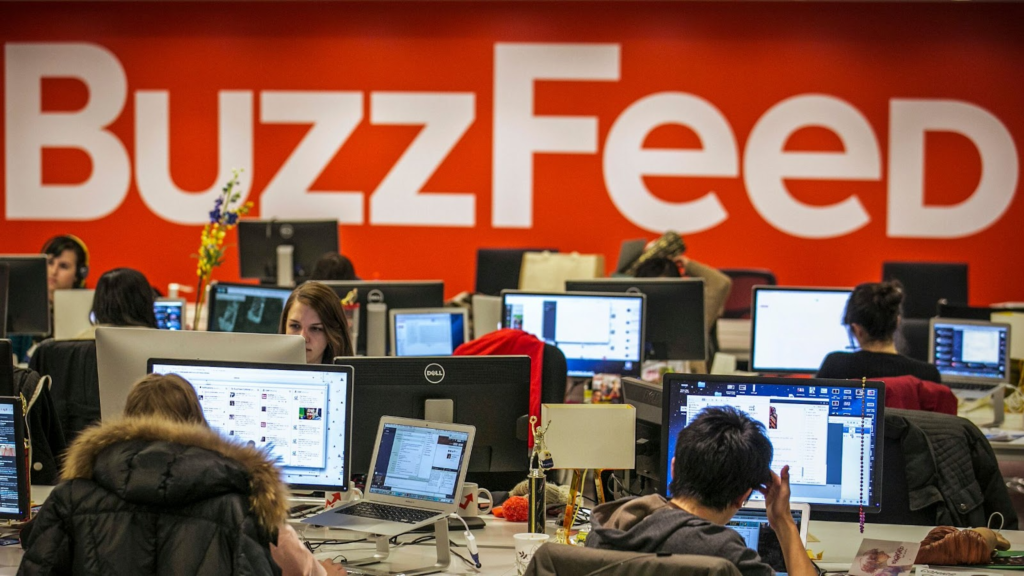
BuzzFeed was originally founded in 2006 by Jonah Peretti, according to Variety. The website originally started as a project based on his work as an MIT Media Lab grad student, studying the spread of viral content. The site is known for its shareable listicles and fun quizzes. However, since its founding, the site branched out to news and original video content.
The NY Times reported that BuzzFeed started its news operation in 2011. They garnered attention for their ambitious and sharp reporting, and went on to open overseas bureaus and invest in investigative journalism. BuzzFeed News pioneered a new kind of journalism, one that adapted to the ever-changing digital age. Their success led more established news organizations including, The Wall Street Journal, The New York Times, and Bloomberg News, to embrace many of the practices BuzzFeed pioneered, in search of online readers.
Despite all its accomplishments, the news division failed to make money, according to the NY Times. The news division relied on digital advertising and social media traffic to cover the large costs of employing journalists around the world.
In 2020, the founding editor of Buzzfeed News, Ben Smith, left in 2020 to become a media columnist at the Times, according to the NY Times. Smith said in an interview that he was “really sad” about the closing. “I’m proud of the work that BuzzFeed News did, but I think this moment is part of the end of a whole era of media,” Smith said. “It’s the end of the marriage between social media and news.”
According to the NY Times, in an email to employees, Peretti, the company’s chief executive, said the closing of the news division is a part of a broader set of job cuts at its parent company BuzzFeed. The closing of the news division will affect about 60 of BuzzFeed’s roughly 1,200 employees, some of whom will be offered jobs at other parts of the company. The company also plans to cut 120 people across its business, content, tech, and administrative teams.
The NY Times reported that before facing a series of financial setbacks, media firms like BuzzFeed and Vox Media were optimistically invested in by industry titans including the Walt Disney Company and Comcast. However, in January, Vox laid off 7 percent of its staff. The company blamed it on the uncertain economic climate.
The layoffs and closing of news publications isn’t exclusive to larger companies. The Center for Information, Technology, and Public Life (CITAP) reports that the economic fallout from the COVID-19 pandemic has accelerated the decline in local newspapers. CITAP reports that at least 30 newspapers closed or merged in April and May 2020. Dozens of newspapers switched to online-only delivery and thousands of journalists at legacy and digital news operations have been furloughed or laid off.
CITAP reports the scope of the problem is much worse than people think. In the US, 200 counties don’t have a local newspaper. Nearly 50% of counties only have one newspaper, usually weekly, and more than 6% of counties have no dedicated news coverage at all.
According to the NY Times, BuzzFeed, alongside other media companies, capitalized off of the growing dominance of tech platforms to deliver audiences to their stories, hoping profits would follow. The news division used attention grabbing and boldface fonts to garner readers. They were also attuned to online conversations and lingo that many news organizations chose to disregard.
CITAP said that as local news sources decline, a growing amount of Americans are receiving their news and other information from social media. The NY Times reports that the ones reaping the benefits of BuzzFeed’s audience-focused practices are tech titans, including Meta, Alphabet, and ByteDance. Digital advertising is increasingly following young consumers to tech platforms like Instagram and TikTok.
The founder and chief executive of the digital media company Skift, Rafat Ali, said that this whole situation was a sharp reminder that news organizations risk becoming obsolete if they don’t focus on several ways to make money.
“The age of disposable media is here,” Ali said. “When you build your business on a trend – in this case, social sharing – and that trend comes to an end, so does your business.”
According to the NY Times, at the height of BuzzFeed News, the company was a beacon for up-and-coming political investigative journalists. In 2021, the site won a Pulitzer Prize for using satellite imagery to report on the Chinese government’s detention of Muslims.
BuzzFeed will continue to publish news on HuffPost, which was bought by BuzzFeed in 2020, the NY Times reports. HuffPost is profitable and less dependent on social platforms.
BuzzFeed’s founder said he was slow to accept that social media platforms wouldn’t provide the financial support to make the news division profitable, according to the NY Times. Peretti said, “I’ve learned from these mistakes, and the team moving forward has learned from them as well.” He said, “We know that the changes and improvements we are making today are necessary to building a better future.”







